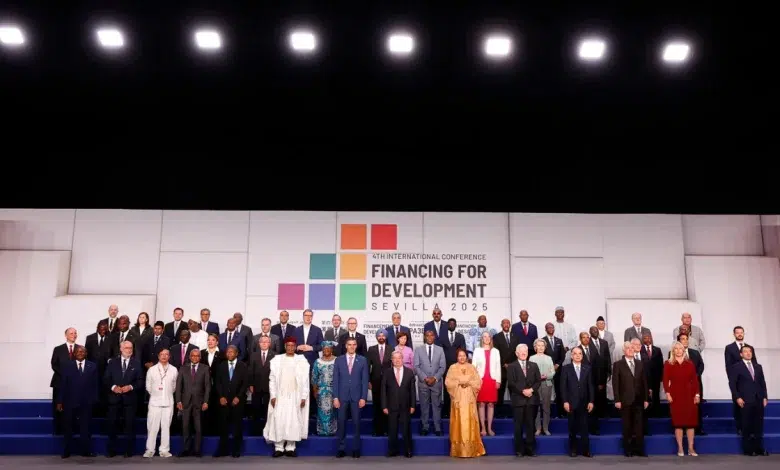
From 30 June to 3 July 2025, South Africa took a leading role at the 4th International Conference on Financing for Development, held in Seville, Spain. This summit was co-hosted by Spanish Prime Minister Pedro Sánchez Pérez-Castejón and United Nations Secretary-General António Guterres. It brought together over 50 world leaders and thousands of delegates to address urgent global financial challenges. These included the reform of international financial systems and the advancement of the Sustainable Development Goals (SDGs).
ALSO READ: G20 Sherpas Meet in South Africa to Drive Global Economic Solutions
South Africa’s Leadership and Delegation
South Africa’s delegation was headed by Minister of International Relations and Cooperation, Ronald Lamola. He was appointed by President Cyril Ramaphosa to lead the country’s participation amid recent domestic political developments requiring close attention. The delegation also included Minister in the Presidency for Planning, Monitoring and Evaluation Maropene Ramokgopa. Deputy Minister of Finance David Masondo and other senior officials were also part of the delegation.
This participation aligns closely with South Africa’s G20 Presidency priorities, which focus on solidarity, equality, and sustainability. These principles underpin South Africa’s push to reshape the global financial system to better support developing economies and the SDGs.
Focus on Debt Relief and Sustainable Financing
A central theme of South Africa’s involvement was the urgent need for debt relief and financial justice for developing countries, especially those in Africa. Many African nations face high structural deficits and liquidity challenges. These factors hinder their economic growth and ability to invest in critical sectors such as health, education, and infrastructure. According to the United Nations Development Programme, debt servicing consumes over 20% of government revenues in several African countries. This severely limits development spending.
South Africa convened a key side event titled “Forging a Common Agenda to Achieve Debt Sustainability in Developing Economies.” This event aimed to bring together global experts, policymakers, and stakeholders involved in debt relief initiatives. The goal was to identify synergies and build consensus on sustainable debt solutions.
The goal is to foster cooperation and collaboration on financial strategies that can reduce the debt burden on developing countries. This would enable them to allocate more resources toward achieving the SDGs. This initiative highlights South Africa’s commitment to advancing the interests of the Global South in international financial reform discussions.
Global Context and Challenges
The conference took place amid a challenging global financing landscape. The United States notably did not participate, citing disagreements over issues such as gender equality, fiscal sustainability, and technology sharing. This absence underscored tensions in global multilateral efforts to address development financing.
The summit produced the Seville Commitment, a document emphasising flexible financing mechanisms, debt relief, and strategies to expand fiscal space for developing countries. However, some advocacy groups, including Oxfam International, criticised the commitment. They argued it lacked ambition and prioritised elite interests over the broader population’s needs.
Despite these criticisms, the conference reaffirmed the importance of multilateralism and the mobilisation of resources through new partnerships and initiatives. Institutions like the European Investment Bank pledged support to vulnerable regions, aiming to boost investment in global development.
RELEVANT ARTICLE: G20 Conference Backs Financial Inclusion and Women’s Economic Empowerment Initiatives
Africa’s Debt Crisis and the Path Forward
Africa’s debt crisis has deepened in recent years. Over half of the continent’s low-income countries are either in or at high risk of debt distress. The African Union has declared 2025 the Year of Reparations. Meanwhile, the Pope has designated it a Jubilee Year, symbolising a call for debt forgiveness and economic justice.
Experts argue that debt cancellation alone is insufficient. There is a growing consensus on the need to reform the global economic system that perpetuates debt dependency. Proposals include shifting decision-making power over sovereign debt from colonial-era institutions like the International Monetary Fund. This power would move to a more inclusive and representative United Nations framework.
South Africa’s active role at the Seville summit reflects this broader movement toward systemic change. By championing debt relief and sustainable financing, South Africa is advocating for a fairer international financial architecture. This system would support long-term development and economic sovereignty for African countries and other developing economies.
INTERESTING READ: G20 Anti-Corruption Working Group Meets in Brasilia
Financial Reform
South Africa’s participation in the 4th International Conference on Financing for Development in Spain highlights its leadership. They are addressing global financial inequalities. Through its delegation and side events, South Africa has pushed for urgent debt relief and reforms to the international financial system. These efforts aim to empower developing countries, particularly in Africa, to overcome structural financial challenges. The goal is to accelerate progress toward the Sustainable Development Goals.
As the global community seeks to rebuild and reform financial systems, South Africa’s voice underscores the necessity of solidarity, equality, and sustainability. These elements are crucial in crafting solutions that leave no country behind.



